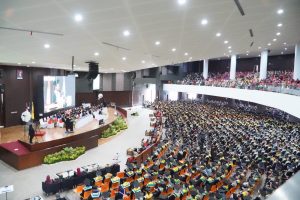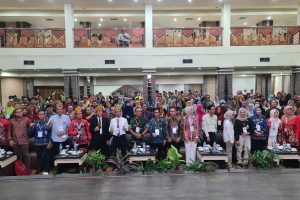ULM Encourages University KPI Improvement Acceleration
Banjarmasin – In the context of accelerating the acceleration of increasing the achievement of Main Performance Indicators for State Universities (IKU PTN) within Lambung Mangkurat University (ULM) in accordance with Kepmendikbud Number 3/M/2021 and PMK No. 29/PKM.05/2022 then a socialization was carried out which was held in the Senate Meeting Room lt. 3, Wednesday (14/6). Given the importance of accelerating PTN KPI improvement, Rector Prof. Dr. Ahmad Alim Bachri, S.E., M.Si invited all Vice Rector, Deans of Faculties, Postgraduate Directors, Bureau Heads and Commitment Making Officers to attend.
In the guidebook published by the Ministry of Education and Culture regarding the guideline for Key Performance Indicators, all KPI points and the data collection process are explained in detail. Those included in the 8 KPIs are:
- Graduates Get Decent Jobs
The first indicator of the attainment of educational institutions or higher education institutions in the Freedom to Learn policy is that graduates get decent jobs. So that graduates or alumni from a campus affect the results of the campus’ achievements. More and more alumni have managed to get decent jobs, or maybe pursue entrepreneurship and continue their studies. So the achievement of this first KPI has been said to be successful. Through this decree, it is hoped that the campus will not only focus on providing an educational curriculum that provides knowledge. However, it also equips students with skills that have market value in the world of work or in society. So they don’t have trouble getting a job.
- Students Gain Experience Off-Campus
The second IKU is for students to gain experience off campus. Includes work internships, research, village projects, student exchanges, entrepreneurship, and also through teaching activities. Through this IKU, it is hoped that the campus will provide more facilities for students to develop themselves. Not only passive in class but carrying out learning activities with varied models, and being able to provide qualified skills.
- Lecturer Activities Outside Campus
The third IKU is lecturers who carry out activities outside the campus, so that the lecturer’s activities are not only on the campus itself. But also outside the campus such as seeking industry experience while teaching at other campuses.
- Teaching Practitioners on Campus
The next IKU is teaching practitioners on campus, so that the teachers are not only lecturers but also practitioners. Namely recruiting lecturers who are experienced in a field so that the knowledge that is shared is more complex, because they have been directly involved in the field.
- The Lecturer’s Work Results are Used by the Community
The fifth KPI is the work of lecturers used by the community. That is related to the results of research conducted should provide great benefits for the surrounding community.
- Study Programs in Collaboration with World Class Partners
The next IKU is the running of study programs in collaboration with world-class partners. So that the Higher Education will undergo collaboration with partners to perfect the study program. Such as internships, absorption of graduates, and others.
- Collaborative and Participatory Classes
The seventh IKU is a collaborative and participatory class, so that the campus together with the lecturers are able to create qualified classes. Can involve students and stimulate their involvement in the learning process in class.
- International Standard Study Program
The last or eighth KPI is an international standard study program, and this relates to international accreditation. So that universities are expected to be able to achieve international accreditation so that they can be widely recognized by the world. It is through this calculation with the KPI that the government and the universities themselves can more easily see the development of educational institutions. So there is no difficulty in pursuing targets to get incentive funds provided by the Ministry of Education and Culture.




